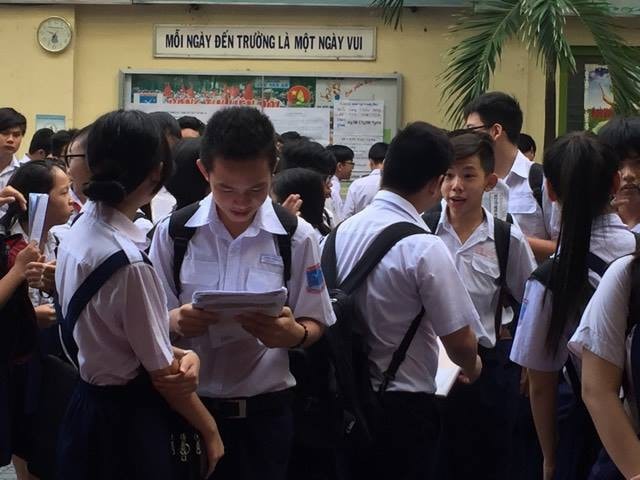Teachers "set up their troops" to lower students' scores
Each student has a different ability to absorb, but the teacher's competition score "sinks and rises" according to the student's score. This leads to many coping strategies of teachers to "save" both teachers and students.
A primary school teacher in Ho Chi Minh City revealed that there are many ways for teachers to “pull” students’ scores. The most common is that when proctoring an exam, the teacher ignores it. Students sit next to each other, not in separate rooms, each student is very crowded so it is easy for them to look at each other’s papers.
Not to mention, when placing students, many teachers cleverly place a good student next to a weak student, perhaps she "entrusts" the good student to support them as "a pair of friends to improve together".

Teachers have many ways to "raise" students' scores. Photo for illustration purposes only.
In primary school, each grade submits three questions to the Board of Directors. Teachers focus on reviewing questions in groups so that students can do the test easily. In addition, teachers implicitly understand that students' reading scores are 5 points regardless of whether students can read or not.
This teacher also said that while the public was shocked when 4th and 5th graders could not read, everyone considered it a joke, but for teachers it was a matter that everyone knew. That was the result of the disease of achievement, everything was evaluated by competition without substance.
Teachers try to avoid losing points in the competition, so the phenomenon of memorization and model lessons, which everyone knows is anti-educational, is still thoroughly applied. At least it helps students easily pass the "gate" of scores, and teachers do not lose points in the competition.
During final exams, it is still common to see students revising by reciting like parrots or copying model essays and model answers. Teachers review for students but they only need to memorize for the test, not understand.
In order for students to get high scores, many teachers put pressure on them and their families, forcing them to study, and creating terrible exam review outlines. For a long time, everyone has known that the education sector has a rule that no homework is given to primary school students, but that is only... theoretical, especially during exam season, students still have to do homework, make outlines, and copy and memorize sample essays.
In Ho Chi Minh City, during semester exams, the leaders of the Department of Education and Training always direct primary schools to organize seriously, thoughtfully, fairly and objectively. Teachers are absolutely not allowed to remind students of their homework, solve problems while supervising, and arbitrarily raise or lower scores when grading students' work.
Schools must also have a review plan for students and a separate plan to help weak students. Absolutely do not chase after achievements to cope, causing pressure and creating a tense, heavy atmosphere for teachers, students and their families.
Cheating on exams and teaching for grades
Not only is cheating on exams to "pull up" students' scores, but the pressure of students' scores to compete with teachers also has a negative impact on teaching methods.
Although the industry calls for innovation in the direction of teaching to develop learners' abilities and qualities, the goal of both teachers and students is still scores. Teaching is actually neglected, leading to many paradoxes.

Exams and pressure of scores and achievements greatly affect the quality of teaching.
Many teachers are lazy to change their teaching methods, teach perfunctorily... but... their achievements are still very high. On the contrary, teachers who put a lot of effort into creating and innovating in teaching can have their points deducted when taking exams. Teaching in a way that students can get high scores even though they know that it is not the best way for them is the priority of many teachers.
Ms. Nguyen Le Anh, a secondary school teacher in Dong Nai, said that to combat achievement in education, we must first change the way of testing, evaluating, and competing for both teachers and students. The testing must be done in a way that tests the students' true abilities, not just memorization or cramming.
As for teachers, to be creative and to teach effectively, they need an open space. But now in most schools, every single thing a teacher does is converted into a competition score, which makes teachers work in a very stifling way, as if they are being monitored.
They work only focusing on results without investing in the teaching process. And the results often do not reflect the true ability of the students and teachers.
The core of fighting against achievements in education is to teach truly, learn truly and evaluate truly. With the current "pressure" on achievements, if the "cope" fails, teachers encounter a class with many weak students, they consider it... bad luck.

